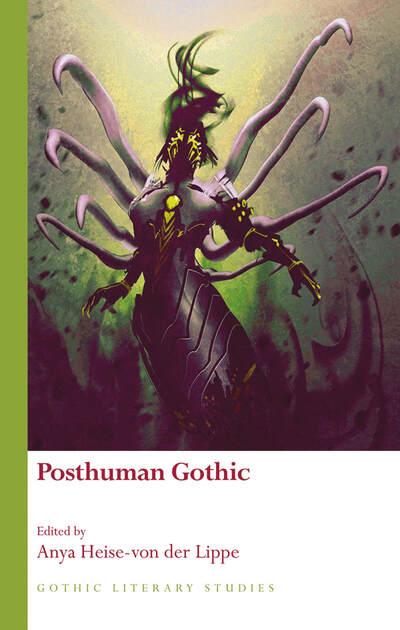
TITLE: Posthuman Gothic
AUTHOR: Anya Heise-von der Lippe (Editor)
PUBLISHER: University of Wales Press
ISBN: 9781786831064
PODCAST EPISODE: None
REVIEWER: Hilary Wilson
Posthuman Gothic (2017) is an intriguing entry in the Gothic Literary Studies series. With this series, the University of Wales Press seeks to bring the best scholarship on this oft-neglected genre to the public in an accessible way. The books within the series run the gamut of topics, seeking to cover everything from the nature of the Queer Other to Gothic Metaphysics. It was only a matter of time before they addressed the Posthuman.
Posthumanism, as a theory, seeks to refute the commonly held tradition of Humanism. It seeks to understand how people might relate to the world and one another when both nature and their own species are viewed with the same philosophical importance. What happens, it asks, when the human becomes the Other rather than vice versa?
Posthuman Gothic examines how Gothic media is uniquely well-suited to answer these questions in its thirteen essays. Is human nature itself more terrifying than the Other?
When the Other and human merge and something new is born, might that something be better rather than more terrifying? How might politics and social norms be affected by the Other becoming your next-door neighbour? What if the Other becomes your object of sexual desire - or you become the Other yourself?
Of particular note was the essay that focused upon the videogame Portal and framed it as a Gothic masterpiece wherein the games antagonist, GLaDOS, has not only her human identity but also her femininity stripped away and quashed. The Gothic genre is often viewed as being stuck forever in the past, so seeing modern media analysed through that lens was a refreshing reminder that not only is the present Gothic - but the future might be, too.
Our world is forever changing thanks to the advent of technology and a greater realization of our responsibilities towards one another. As our perspectives change towards the global, the human position begins to diminish and Humanism as a perspective becomes obsolete. This book, and others within the Gothic Literary Studies series, proves that the Gothic has shown us a way forward towards a way of Being that can heal rather than hurt. It is impossible to read a book such as Posthuman Gothic and not come away changed for the better. The future might be impossible to recognize, but it will forever be interesting.
AUTHOR: Anya Heise-von der Lippe (Editor)
PUBLISHER: University of Wales Press
ISBN: 9781786831064
PODCAST EPISODE: None
REVIEWER: Hilary Wilson
Posthuman Gothic (2017) is an intriguing entry in the Gothic Literary Studies series. With this series, the University of Wales Press seeks to bring the best scholarship on this oft-neglected genre to the public in an accessible way. The books within the series run the gamut of topics, seeking to cover everything from the nature of the Queer Other to Gothic Metaphysics. It was only a matter of time before they addressed the Posthuman.
Posthumanism, as a theory, seeks to refute the commonly held tradition of Humanism. It seeks to understand how people might relate to the world and one another when both nature and their own species are viewed with the same philosophical importance. What happens, it asks, when the human becomes the Other rather than vice versa?
Posthuman Gothic examines how Gothic media is uniquely well-suited to answer these questions in its thirteen essays. Is human nature itself more terrifying than the Other?
When the Other and human merge and something new is born, might that something be better rather than more terrifying? How might politics and social norms be affected by the Other becoming your next-door neighbour? What if the Other becomes your object of sexual desire - or you become the Other yourself?
Of particular note was the essay that focused upon the videogame Portal and framed it as a Gothic masterpiece wherein the games antagonist, GLaDOS, has not only her human identity but also her femininity stripped away and quashed. The Gothic genre is often viewed as being stuck forever in the past, so seeing modern media analysed through that lens was a refreshing reminder that not only is the present Gothic - but the future might be, too.
Our world is forever changing thanks to the advent of technology and a greater realization of our responsibilities towards one another. As our perspectives change towards the global, the human position begins to diminish and Humanism as a perspective becomes obsolete. This book, and others within the Gothic Literary Studies series, proves that the Gothic has shown us a way forward towards a way of Being that can heal rather than hurt. It is impossible to read a book such as Posthuman Gothic and not come away changed for the better. The future might be impossible to recognize, but it will forever be interesting.